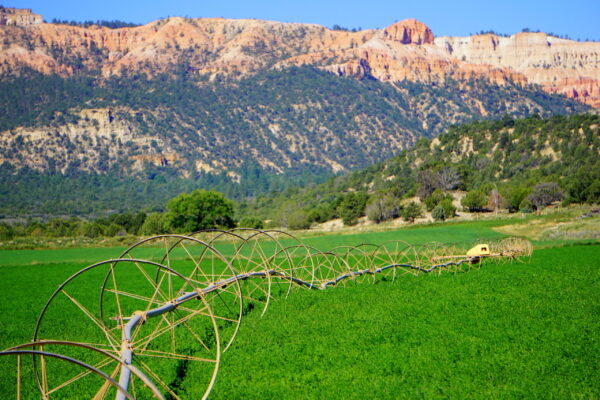“The Fight for Control” is part 1 in an 8-part series focused on explaining a document called “A Manifesto for Local Stewardship.” The manifesto, which made its rounds in summer of 2022, was published in The Byway’s most recent September paper.
Special interest groups often use misleading narratives in an effort to strip locals of their voice on public lands issues.
Tenure is hard to beat — a fact that is true both in politics, and land management.
For decades, environmentalists have been frustrated in their fight against public land grazing as they find 5th-generation ranchers, protected by century-old grazing permits, are hard to uproot. Unable to change the game rules by legislating away grazing rights, environmentalists have turned to other tactics to fight grazers: namely, defamation.
This approach takes straight from the playbook of America’s most vigorous political campaigns.
In what was dubbed the nastiest campaign of 2014, Mississippi state Senator Chris McDaniel (R) launched a U.S. Senate bid against six-term incumbent Thad Cochran. Cochran, also a Republican, had been well-liked in his state since first taking the seat in 1978. But a challenge from a Tea-Partier soon proved strong enough to give the seat toss-up status.
But it was the tone of that race that caught national attention, with allegations of vote-buying, infidelity, arrests, convictions, litigation and “indecent things with animals.” In one scandal, a McDaniel supporter broke into the nursing home where Cochran’s ailing wife had been housed for years. There, he photographed her and posted the pictures publicly, insinuating Cochran was having an affair with a staffer while his wife languished.
Cochran eventually won the primary, narrowly, in a run-off after both campaigns accused the other of lies.
Kevin J. O’Toole, who served in the New Jersey state Senate, had some advice for beating incumbents in political races.
“If crime is up, blame the incumbent,” O’Toole said. “If taxes and spending increases, blame the incumbent. If area hospitals have lost funding, blame the incumbent. If senior centers didn’t qualify for more money, blame the incumbent. Get the point?”
It’s not that all those things were the incumbent’s fault. But O’Toole’s message merely elaborated on the dirty game of smearing the incumbent by researching their history to find everything wrong, and then to “narrow the hits” to the most unsavory talking points. “You must narrow those to a select few earth shattering head shots, and repeat them over and over.”
Like those running for public office, environmentalists know that in order to gain control, they have to win the public mind. In the fight for control over public lands, they have to share two important messages: first, that the locals currently on the land are destroying the land, and second, that we environmentalists would do a better job if you would just give us control.
There are plenty of faults environmentalists can point to, since ranchers have had so many decades to accumulate mistakes. And they certainly have, as any incumbent does. But the most undisciplined environmentalists not only point out the flaws, but also misconstrue them in a deliberate attempt to mislead the public.
Special interest groups often use misleading narratives in an effort to strip locals of their voice on public lands issues, even though the locals know the most about those lands. The special interest groups’ game is simple: remove locals from control, and give it to us.
One such case was covered in The Byway in April, 2022. George Wuerthner, writing for The Wildlife News, visited parts of Dixie National Forest just up from Escalante and took pictures of the Lower Box Trailhead parking lot, which doubles as a cattle staging area, to show overgrazing. “The nearly complete annihilation of vegetation by livestock vandelism [sic] seen here should result in the termination of any grazing privileges,” Wuerthner wrote of the field. Then he added that the rest of the area was in a similar condition. Except it wasn’t.
Environmentalists have also painted the “cowboy” as an emblem of toxic masculinity. “See, this cowboy is dead and his stand-ins are, rightly, going extinct,” wrote Nathan Stevens for Medium. “As much as the cowboy is revered, he doesn’t have a place in the modern world.”
Erik Molvar, Executive Director of environmental group Western Watersheds Project, concurred. “Most Americans are beginning to see the cowboy myth for what it truly is: a distracting cover for an even greater land heist to turn even more of our national inheritance over to commercial exploitation,” he wrote.
Never mind that these environmental groups are engaged in the same attempted “land heist” they accuse the ranchers of.
Unfortunately, the ranching community does little to counteract the misleading narratives promulgated by the environmentalist class. If grazing permits didn’t already constitute an actual right rather than a revocable “privilege” as some argue, special interest groups would have stripped these away already.
The ones closest to the land are the ones who know what is actually happening there. But if these people aren’t willing to tell their own story, their story will be told — by those who don’t care about the truth.
– by AJ Martel
Feature image caption: An alfalfa field at a farm just south of Tropic, under the rim of Bryce Canyon National Park.
AJ Martel – Escalante
AJ Martel is the youth coordinator at The Byway, but he is involved in most everything. He and his family live in Escalante, and they love it here! AJ has found Utah’s small towns quite inviting and under-defended, which is why he’s so involved with the paper. What AJ loves to do most, though, is serve his community. That is clear through everything he writes and does for Escalante, Utah.

